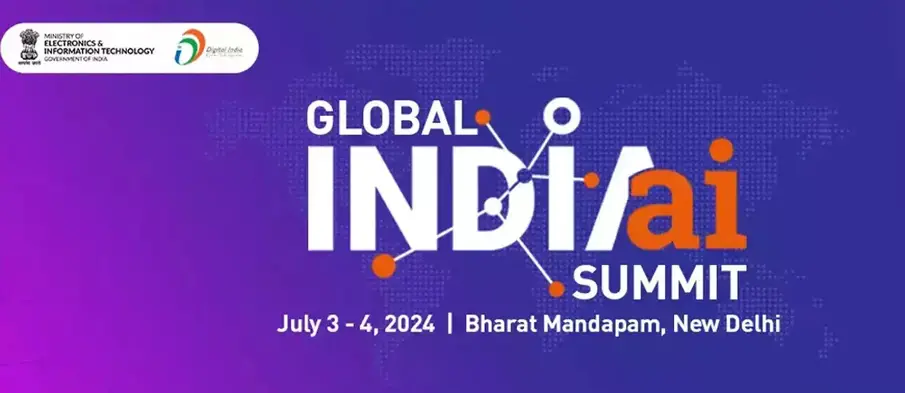
At this critical juncture of rapid AI advancements, the discussion delved into the intersection of technology, policy, ethics, and societal impact. The transformative potential of AI across sectors is undeniable, yet it brings forth challenges that demand robust governance frameworks. Panellists explored how initiatives like the Safe and Trusted AI pillar under the India AI Mission are shaping comprehensive governance structures. the aim was to navigate the complexities of balancing innovation with safeguarding citizen interests, with a focus on fairness, transparency, and security.
Fostering Inclusivity in AI Development To foster inclusivity in AI development, a multi-faceted approach is essential. This involves creating accessible AI tools and platforms, promoting AI literacy across diverse demographics, and actively engaging underrepresented communities in the AI development process. Public-private partnerships play a significant role in funding and deploying AI solutions tailored to the needs of marginalized groups. Policies and regulations must mandate equitable data representation and unbiased algorithm design to prevent systemic discrimination and ensure fair access to AI benefits. Shri. Mahaveer Singhvi, Joint Secretary, NEST, Ministry of External Affairs, highlighted, “The India AI Mission’s seven pillars ensure inclusive, equitable AI benefits through innovation, public-private partnerships, skills development, and safe, trusted AI.”
Establishing a Robust Ethical Framework, A robust ethical framework is crucial for harnessing the positive effects of AI. This includes implementing stringent regulatory measures, conducting regular audits of AI systems, and fostering a culture of transparency and accountability among AI developers and users. Encouraging interdisciplinary collaboration can help foresee and mitigate potential negative impacts of AI. Continuous monitoring and assessment of AI applications, along with public consultations, ensure that AI technologies align with societal values and public interest. Shri Bhuvnesh Kumar, Additional Secretary, MeitY, added, “Democracy’s consultative, multi-stakeholder approach integrates expert opinions and talent to ensure beneficial AI development. Specific AI mechanisms are needed but should not be overly restrictive to maximize benefits.”
Ensuring Accountability and Transparency the India AI Mission can ensure accountability and transparency by establishing clear guidelines and standards for AI development and deployment. This includes mandating explain ability in AI systems, where developers must provide understandable explanations for AI decisions. Regular audits and assessments of AI algorithms for biases and fairness should be conducted, with a regulatory body overseeing these processes. Involving diverse stakeholders in the development phase can help identify and mitigate biases early on. Dr. Urvashi Aneja, Founding Director, Digital Futures Lab, highlighted the need for a different approach altogether, stating “Instead of a process-based approach, we need an outcome-based approach where society defines the desired outcomes from AI products and tools. Companies should innovate towards this vision, not the market.”
Strengthening Regulatory Frameworks Existing laws provide a foundation for regulating AI, focusing on data protection and consumer rights. However, they may lack specificity and flexibility to address the fast-evolving nature of AI technologies. While current laws emphasize data protection and consumer rights, enforcement mechanisms need strengthening and continuous updates to keep pace with technological advancements. The government can adapt by establishing a dedicated AI regulatory body, fostering international collaborations for knowledge exchange, and regularly revising laws to incorporate new developments and insights.
UNESCO’s Role in Promoting Ethical AI UNESCO supports AI research and innovation by providing a platform for international cooperation and dialogue on ethical AI. It develops guidelines and recommendations to promote human-centred AI, emphasizing inclusivity, transparency, and accountability. UNESCO also funds projects that align with its ethical standards and governance frameworks, ensuring that AI advancements contribute positively to society and uphold fundamental human rights. Mr. Tim Curtis, Director of UNESCO’s Office in New Delhi, emphasizes the need for a global AI Readiness assessment to establish common standards and ensure AI implementation benefits everyone. This involves evaluating AI readiness in various countries and leveraging AI to advance sustainable development goals globally.
India’s Leadership in Digital Public Infrastructure India has positioned itself as a leader in Digital Public Infrastructure by leveraging its robust technological ecosystem to create scalable and inclusive digital solutions. Initiatives like Aadhaar, UPI, and India Stack have set global benchmarks for digital identity, payments, and service delivery. By sharing its DPI models with other countries, India promotes digital inclusion and innovation on a global scale, fostering international partnerships and contributing to the global digital economy.
India’s Active Participation in Global Forums such as the G20 and the UN to advocate for its priorities, such as digital inclusion, sustainable development, and ethical AI. By engaging in these platforms, India collaborates with other nations to shape global policies and standards. It also uses these forums to highlight its achievements and share best practices, ensuring that its interests are represented and addressed in international decision-making processes.
The Role of the Global Partnership on AI (GPAI) is crucial in supporting international policy coordination by fostering collaboration among member countries, promoting research, and sharing best practices. However, gaps exist in ensuring equal representation and addressing the diverse needs of all countries. Opportunities lie in enhancing capacity-building initiatives, facilitating greater inclusivity in AI governance discussions, and developing common frameworks that accommodate different regulatory environments and stages of AI maturity.
To conclude, the discussion emphasized the need for robust governance frameworks in navigating AI’s transformative impact responsibly. India’s leadership, exemplified by initiatives like the Safe and Trusted AI pillar, set standards for balancing innovation with ethical considerations. Moving forward, ongoing dialogue, sharing of best practices, and policy advancements are crucial to ensuring AI deployment aligns with societal values and aspirations.




